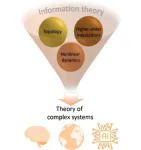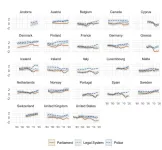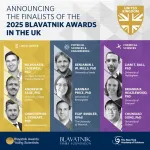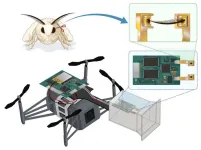Enhancing shareholder accountability: Lessons from Japan’s corporate governance reforms
Study finds increased shareholder dissent in director elections after Japan’s Stewardship Code amendment on voluntary vote disclosure
2025-02-19
(Press-News.org)
Shareholders play a crucial role in corporate governance by voting on key decisions in the companies they invest in. To enhance transparency, regulatory bodies worldwide—such as government agencies and stock exchanges—are increasingly implementing guidelines to hold institutional investors accountable for their voting behavior and ensure they fulfill their fiduciary duties.
A study published in the journal Corporate Governance: An International Review on 22 January 2025 demonstrates that these regulations, even if non-binding, can encourage institutional investors to play a more active role and improve corporate governance. The study, conducted by Professor Toru Yoshikawa from Waseda University and Associate Professor Daisuke Uchida from Keio University, examined how institutional investors responded to the 2017 amendment to Japan’s Stewardship Code, which encouraged them to disclose their voting records.
“The regulatory change in the disclosure of voting records in 2017 encourages institutional investors to engage in corporate governance of their invested firms,” says Yoshikawa. “We were interested in how institutional investors, who are major corporate governance actors, reacted to this change, especially in the differences between domestic investors that were often perceived as passive in their corporate governance role and foreign investors that tend to be more active.”
To examine the impact of the regulatory change on shareholder voting, the researchers analyzed 7,887 voting proposals, covering 5,051 directors from 495 TOPIX 500 firms and the top 500 companies on the Tokyo Stock Exchange. Director candidates are recommended by the company’s board, and historically, domestic Japanese institutional investors often supported these nominees to maintain good relationships with the companies they invested in. However, after the disclosure rule took effect, the study found a significant increase in shareholder dissent in director elections.
This shift was especially noticeable in companies with high domestic institutional ownership, while companies with more foreign institutional investors saw little to no change in voting patterns. Moreover, shareholder dissent against board-recommended directors was strongest when directors were seen as underperforming or unqualified. “Prior studies show that foreign investors have different objectives from domestic investors, and they tend to pay greater attention to the corporate governance of their invested firms. However, our study shows that domestic investors more strongly reacted to the regulatory change on disclosure of voting records than foreign investors; domestic investors started to cast more dissenting votes on director candidates at general shareholders’ meetings,” says Yoshikawa.
The researchers explain that domestic institutional investors—such as local banks, trust banks, and insurance companies—are more likely to respond to local regulations because they rely on local regulatory bodies for legitimacy, whereas foreign institutional investors, who often adhere to international standards, are less influenced by domestic regulations. “Our theory and findings show that domestic institutional investors tend to diverge from foreign institutional investors in response to regulatory signals due to their different levels of dependence on the legitimacy conferred by regulatory bodies, even though they all fall under the same label of institutional investors. This suggests that shareholder preferences are not only heterogeneous but also mutable over time,” says Yoshikawa.
The increased accountability in shareholder voting following Japan’s disclosure rule demonstrates that regulatory reforms can improve corporate governance. The findings can serve as a blueprint for implementing regulatory measures in other countries in Asia that are transitioning to Western-style corporate governance systems.
***
Reference
Authors: Daisuke Uchida1 and Toru Yoshikawa2
DOI: 10.1111/corg.12640
Affiliations: (1) Faculty of Business and Commerce, Keio University, Tokyo
(2) School of Social Sciences, Waseda University, Tokyo
About Waseda University
Located in the heart of Tokyo, Waseda University is a leading private research university that has long been dedicated to academic excellence, innovative research, and civic engagement at both the local and global levels since 1882. The University has produced many changemakers in its history, including nine prime ministers and many leaders in business, science and technology, literature, sports, and film. Waseda has strong collaborations with overseas research institutions and is committed to advancing cutting-edge research and developing leaders who can contribute to the resolution of complex global social issues. The University has set a target of achieving a zero-carbon campus by 2032, which is in line with the Sustainable Development Goals (SDGs) adopted by the United Nations in 2015.
To learn more about Waseda University, visit https://www.waseda.jp/top/en
About Professor Toru Yoshikawa from Waseda University
Dr. Toru Yoshikawa began working at Waseda University’s Faculty of Social Sciences in 2023. He specializes in business administration, strategic management, corporate governance, top management teams, innovation, and international business. He obtained his PhD from York University and has previously taught at Nihon University, McMaster University, and Singapore Management University. Prior to that, he spent a number of years working in the finance industry. Dr. Yoshikawa is a member of the Academy of Management, the Academy of International Business, the Strategic Management Society, and the International Corporate Governance Society.
END
[Attachments] See images for this press release:
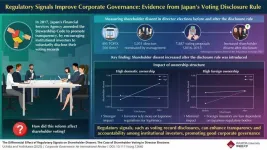
ELSE PRESS RELEASES FROM THIS DATE:
2025-02-19
Procedure is simple and could be adopted by most U.S. hospitals
Roughly 2 million people in the U.S. live with limb loss; number is expected to rise
Senior author, a retired U.S. Army colonel, traveled to Ukraine to set up the study
CHICAGO --- A reliable method to treat post-amputation pain remains elusive, but a new Northwestern Medicine study conducted in collaboration with Ukrainian physicians suggests that hydrodissection — a simple procedure that injects fluid around nerves — may reduce residual limb pain and opioid dependence.
The ...
2025-02-19
(Embargo: 19 Feb, 10am GMT) A groundbreaking study led by Professor Ginestra Bianconi from Queen Mary University of London, in collaboration with international researchers, has unveiled a transformative framework for understanding complex systems. Published in Nature Physics, this pioneering study establishes the new field of higher-order topological dynamics, revealing how the hidden geometry of networks shapes everything from brain activity to artificial intelligence.
“Complex systems like the brain, climate, and next-generation artificial intelligence rely on interactions that extend beyond simple pairwise relationships. Our study reveals ...
2025-02-19
A new study led by researchers from Oxford Population Health has shown that a range of environmental factors, including lifestyle (smoking and physical activity), and living conditions, have a greater impact on health and premature death than our genes.
The researchers used data from nearly half a million UK Biobank participants to assess the influence of 164 environmental factors and genetic risk scores for 22 major diseases on ageing, age-related diseases, and premature death. The study is published today in Nature Medicine.
Key findings
Environmental factors explained 17% of the variation in risk of death, compared to less than 2% explained by genetic predisposition (as ...
2025-02-19
Imagine a breakthrough in cancer treatment where only malignant cells are targeted, sparing healthy host cells; or patients with abnormal protein synthesis are treated to produce a healthy protein. Hiroshi Abe and his colleagues at Nagoya University have identified two applications, among others, in a new study. Their innovative approach, reported in Nature Biotechnology, called the Internal Cap-Initiated Translation (ICIT) mechanism, introduces a novel way to 'switch on' protein synthesis ...
2025-02-19
UNIVERSITY PARK, Pa. — There is a big problem with quantum technology — it’s tiny. The distinctive properties that exist at the subatomic scale usually disappear at macroscopic scales, making it difficult to harness their superior sensing and communication capabilities for real-world applications, like optical systems and advanced computing. Now, however, an international team led by physicists at Penn State and Columbia University has developed a novel approach to maintain special quantum characteristics, even in three-dimensional (3D) materials.
The researchers published ...
2025-02-19
Illustration
A quantum "miracle material" could support magnetic switching, a team of researchers at the University of Regensburg and University of Michigan has shown.
This recently discovered capability could help enable applications in quantum computing, sensing and more. While earlier studies identified that quantum entities called excitons are sometimes effectively confined to a single line within the material chromium sulfide bromide, the new research provides a ...
2025-02-19
Acting in the right place at the right time is the key to effective medical treatment with minimal side effects. However, this feat remains difficult to achieve. Biologists and chemists at the University of Geneva (UNIGE) have succeeded in developing a tool that controls the location at which a molecule is activated by a simple pulse of light lasting only a few seconds. Tested on a protein essential for cell division, this system could be applied to other molecules. The potential applications are vast, both in basic research and in improving ...
2025-02-19
New research from the University of Southampton has found that trust in representative institutions, such as parliaments, governments and political parties, has been declining in democratic countries around the world.
The study, published in The British Journal of Political Science, presents the largest and most comprehensive analysis of trends in political trust worldwide to date. It brings together results from 3,377 surveys covering 143 countries between 1958 and 2019, representing over five million survey respondents.
Whereas trust in representative institutions is generally in decline, trust in non-representative institutions ...
2025-02-19
19 February 2025 – London – The Blavatnik Family Foundation and The New York Academy of Sciences today announced the Finalists for the eighth Blavatnik Awards for Young Scientists in the United Kingdom. The Awards recognise scientific advances by UK researchers across Life Sciences, Chemical Sciences, and Physical Sciences & Engineering.
On Wednesday, 4 March, Professor Shitij Kapur, FMedSci, Vice-Chancellor & President, King’s College London, will announce the three 2025 Laureates at a gala dinner and awards ceremony. The three Laureates will each receive an unrestricted award of £100,000 (US$126,000). ...
2025-02-19
Conventional drones use visual sensors for navigation. However, environmental conditions like dampness, low light, and dust can hinder their effectiveness, limiting their use in disaster-stricken areas. Researchers from Japan have developed a novel bio-hybrid drone by combining robotic elements with odor-sensing antennae from silkworm moths. Their innovation, which integrates the agility and precision of robots with biological sensory mechanisms, can enhance the applicability of drones in navigation, gas sensing, and disaster response.
Technological advances have led to the development of drones with diverse applications, ...
LAST 30 PRESS RELEASES:
[Press-News.org] Enhancing shareholder accountability: Lessons from Japan’s corporate governance reforms
Study finds increased shareholder dissent in director elections after Japan’s Stewardship Code amendment on voluntary vote disclosure

